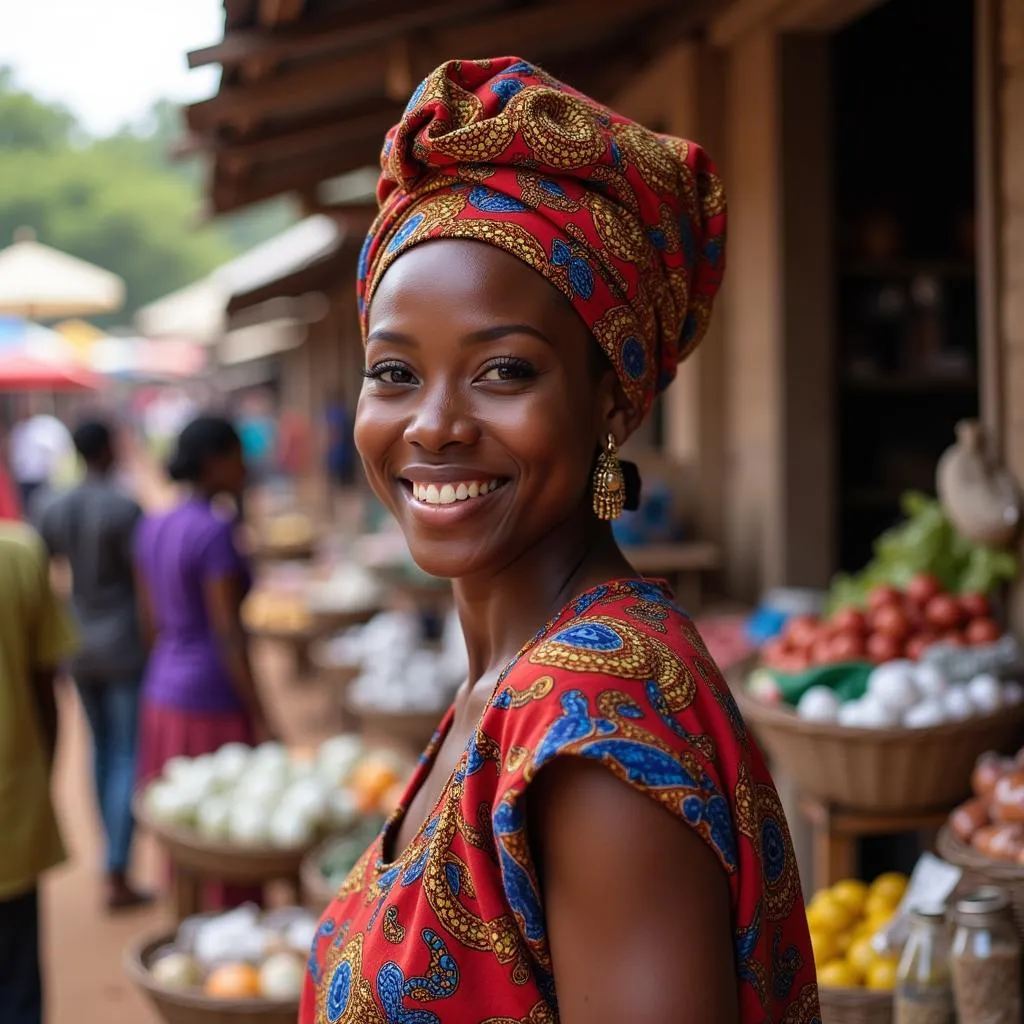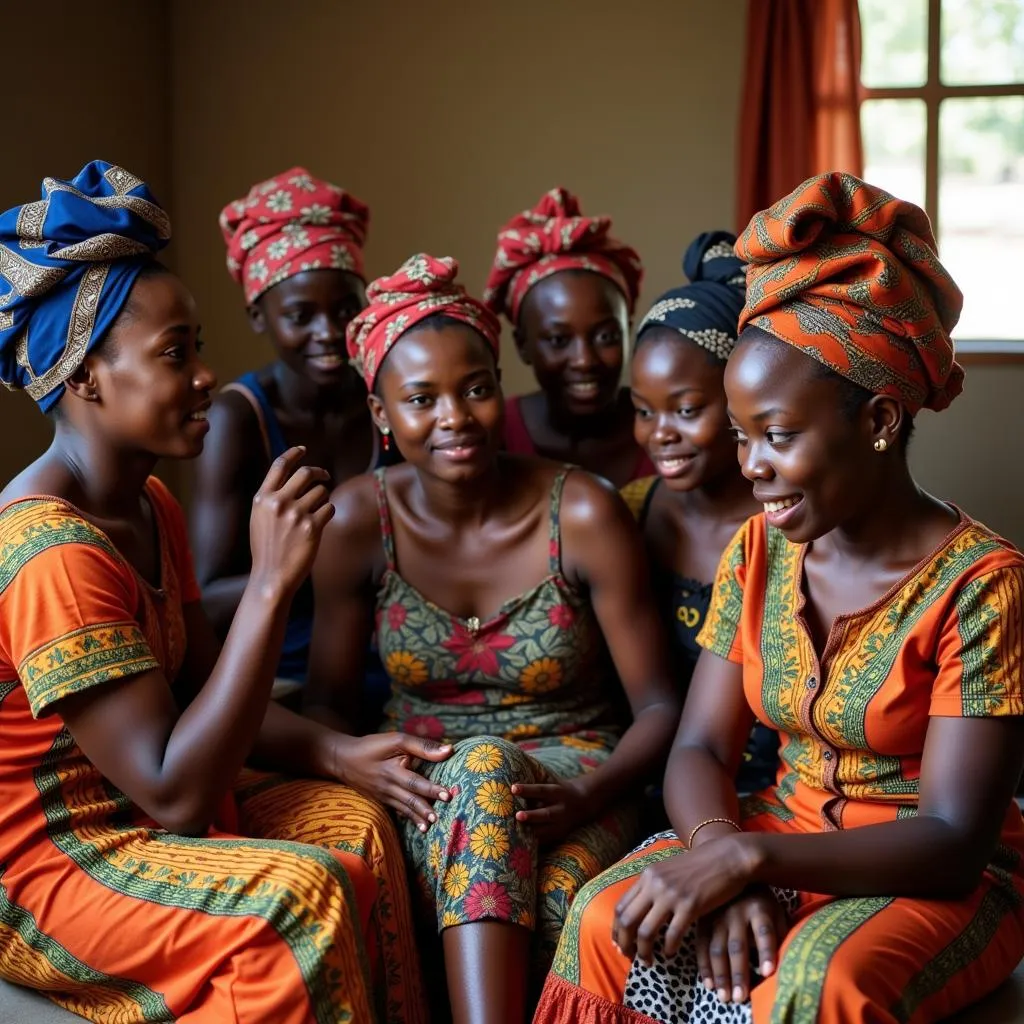The Art and Tradition of African Hair Wraps
African Hair Wraps, steeped in rich history and cultural significance, are more than just a style statement. They are a vibrant tapestry of tradition, artistry, and self-expression woven into the very fabric of African societies. For centuries, these intricate headwraps have adorned the heads of men, women, and children across the continent, signifying everything from social status and marital status to religious beliefs and ethnic identity.
 Woman with Colorful Headwrap in Marketplace
Woman with Colorful Headwrap in Marketplace
A Legacy Passed Down Through Generations
The origins of African hair wraps can be traced back to ancient civilizations, with evidence suggesting their existence as far back as ancient Egypt. Depictions in hieroglyphics and sculptures highlight the elaborate hairstyles and head coverings worn by Egyptians from all walks of life. Over time, this tradition evolved and spread throughout the continent, adapting to the customs and aesthetics of different regions and tribes.
More Than Just Fabric: The Language of Wraps
In many African cultures, the art of hair wrapping is a skill passed down through generations of women. It’s a bonding experience, with mothers and grandmothers teaching younger women the techniques and traditions associated with their specific community or tribe. The way a wrap is tied, the fabric used, and even the colors incorporated can convey subtle messages about the wearer’s background, age, marital status, or social standing. For example, in some cultures, a headwrap tilted to the side might indicate a woman is married, while a brightly colored, elaborate wrap could signify a festive occasion.
 Women Tying Headwraps Together
Women Tying Headwraps Together
A Celebration of Versatility and Creativity
One of the most captivating aspects of African hair wraps is their incredible versatility. From simple and elegant designs for everyday wear to elaborate and ornate creations reserved for special events, the possibilities are endless. The fabrics used are as diverse as the continent itself, ranging from handwoven kente cloth from Ghana and mud cloth from Mali to brightly colored Ankara prints and delicate silks.
African Hair Wraps in the Modern World
Today, African hair wraps continue to be an important part of many cultures, serving as a powerful symbol of heritage and identity. Moreover, they have transcended geographical boundaries and gained global recognition as a stylish and versatile accessory. From fashion runways and red carpets to everyday street style, African hair wraps have become a celebrated form of self-expression and a testament to the enduring legacy of African culture.
Frequently Asked Questions about African Hair Wraps
What is the cultural significance of African hair wraps?
African hair wraps hold deep cultural significance, representing heritage, identity, and social standing. They are used to communicate various messages about the wearer, including their marital status, age, and social standing.
What are some popular fabrics used for African hair wraps?
Popular fabrics include kente cloth, Ankara prints, mud cloth, Aso Oke fabric, and Gele. Each fabric carries its own cultural significance and aesthetic appeal.
Are African hair wraps only worn by women?
While predominantly worn by women, African hair wraps are not exclusively for females. In some cultures, men also wear headwraps, often signifying their social standing or profession.
How can I learn to tie African hair wraps?
There are numerous online resources, tutorials, and workshops dedicated to teaching the art of African hair wrapping. You can also learn from individuals within your community who have experience with this tradition.
Where can I purchase authentic African hair wraps?
Authentic African hair wraps can be found at African-owned businesses, specialty stores, and online marketplaces. When purchasing, it’s important to support ethical and sustainable practices that honor the cultural significance of these garments.
Need More Information?
Do you have more questions about African hair wraps or other aspects of African culture? Explore more articles on our website, including:
Contact Us
For any assistance or inquiries, feel free to contact us:
Phone Number: +255768904061
Email: kaka.mag@gmail.com
Address: Mbarali DC Mawindi, Kangaga, Tanzania.
Our customer service team is available 24/7 to assist you.